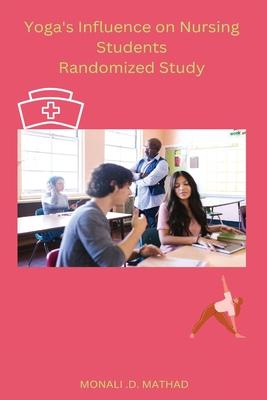In a groundbreaking randomized study conducted among nursing students, the profound impact of yoga on their overall well-being, stress levels, and academic performance was meticulously examined. The research, designed to assess the potential benefits of integrating yoga into the demanding curriculum of nursing education, sought to provide empirical evidence on the effectiveness of yoga as a holistic approach to supporting the mental and physical health of future healthcare professionals. The study, conducted over a period of six months, involved a diverse group of nursing students randomly assigned to either a yoga intervention group or a control group that did not participate in any structured yoga activities. The yoga intervention comprised regular sessions incorporating a blend of physical postures, breath control exercises, and mindfulness techniques. The control group, on the other hand, continued with their standard academic routine without any additional interventions. Throughout the study, participants' stress levels were assessed using standardized measures, and academic performance was tracked through grades and self-reported data. The results unveiled a compelling narrative of the positive influence of yoga on nursing students. Those engaged in the yoga intervention reported a significant reduction in stress levels compared to their counterparts in the control group. The practice of yoga not only served as a physical outlet but also emerged as a potent tool for cultivating mindfulness and resilience in the face of the rigorous demands of nursing education. Furthermore, the impact of yoga on academic performance was a notable revelation. Students who participated in regular yoga sessions exhibited improved concentration, heightened cognitive abilities, and a greater capacity to manage the multifaceted challenges inherent in their academic pursuits. The integration of yoga into the curriculum thus emerged as a potential strategy to enhance the overall educational experience for nursing students. Beyond the quantitative data, qualitative findings from the study provided rich insights into the subjective experiences of nursing students practicing yoga. Participants reported a heightened sense of self-awareness, improved emotional regulation, and a greater ability to cope with the emotional demands of their future profession. The cultivation of a mind-body connection through yoga was identified as a valuable asset in fostering not only personal well-being but also a deeper understanding of the interconnectedness between mental and physical health-an essential perspective for healthcare professionals.

Yoga's Influence on Nursing Students Randomized Study
In a groundbreaking randomized study conducted among nursing students, the profound impact of yoga on their overall well-being, stress levels, and academic performance was meticulously examined. The research, designed to assess the potential benefits of integrating yoga into the demanding curriculum of nursing education, sought to provide empirical evidence on the effectiveness of yoga as a holistic approach to supporting the mental and physical health of future healthcare professionals. The study, conducted over a period of six months, involved a diverse group of nursing students randomly assigned to either a yoga intervention group or a control group that did not participate in any structured yoga activities. The yoga intervention comprised regular sessions incorporating a blend of physical postures, breath control exercises, and mindfulness techniques. The control group, on the other hand, continued with their standard academic routine without any additional interventions. Throughout the study, participants' stress levels were assessed using standardized measures, and academic performance was tracked through grades and self-reported data. The results unveiled a compelling narrative of the positive influence of yoga on nursing students. Those engaged in the yoga intervention reported a significant reduction in stress levels compared to their counterparts in the control group. The practice of yoga not only served as a physical outlet but also emerged as a potent tool for cultivating mindfulness and resilience in the face of the rigorous demands of nursing education. Furthermore, the impact of yoga on academic performance was a notable revelation. Students who participated in regular yoga sessions exhibited improved concentration, heightened cognitive abilities, and a greater capacity to manage the multifaceted challenges inherent in their academic pursuits. The integration of yoga into the curriculum thus emerged as a potential strategy to enhance the overall educational experience for nursing students. Beyond the quantitative data, qualitative findings from the study provided rich insights into the subjective experiences of nursing students practicing yoga. Participants reported a heightened sense of self-awareness, improved emotional regulation, and a greater ability to cope with the emotional demands of their future profession. The cultivation of a mind-body connection through yoga was identified as a valuable asset in fostering not only personal well-being but also a deeper understanding of the interconnectedness between mental and physical health-an essential perspective for healthcare professionals.